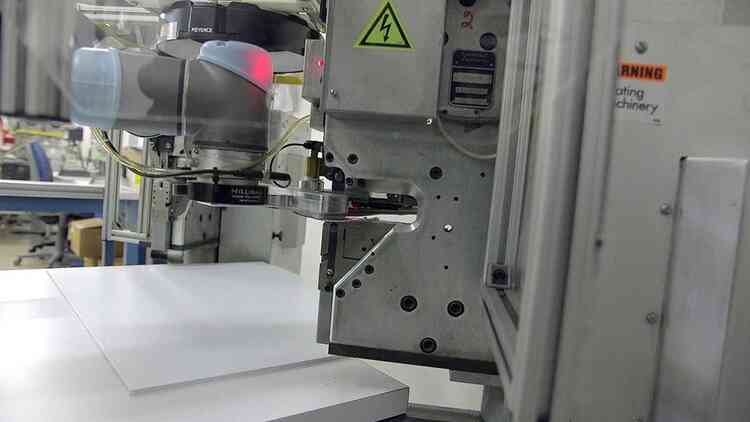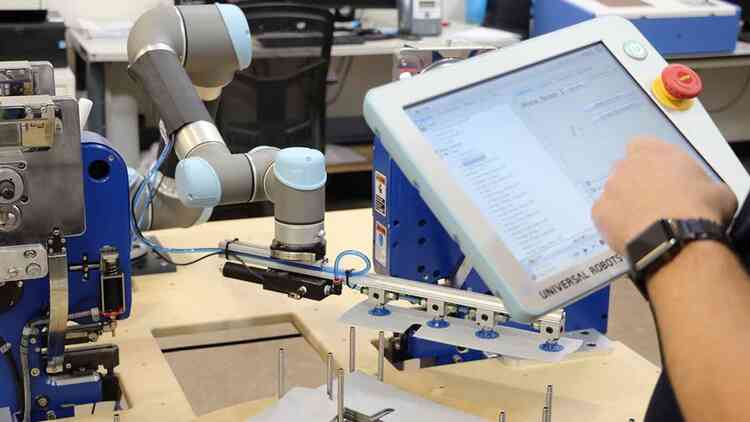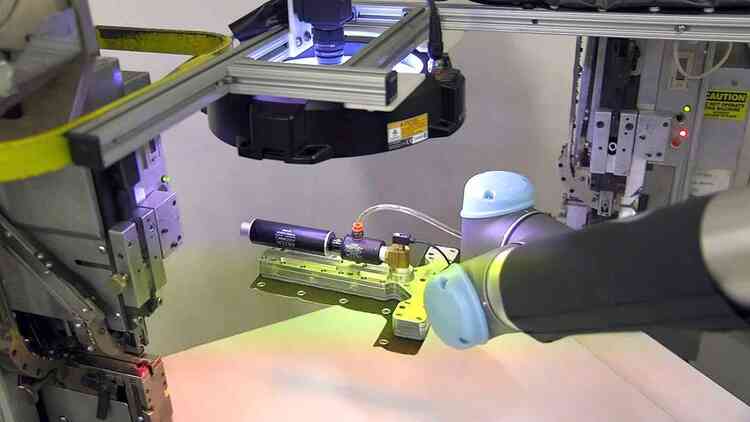
Case Studies / Industrial Robots / How Connected Robots are Transforming Manufacturing / Collaborative Robots
Snappy collaborative robots at Zippertubing Company
zero defect rate while doubling production output
Jun 16, 2021 — With no robotics experience, the family-owned Zippertubing Company integrated Universal Robots in vision-guided applications tending snap fastening machines for wrap-around cable jacketing.The Challenge
“What integrator are you using?” A question Tim Mead, operations manager with Zippertubing in Arizona kept hearing as he visited robot manufacturers at trade shows. “But we wanted something that we could integrate ourselves. Something that would save us a lot of money and bring the installation down to a price point that made sense for us,” says Tim Mead. His company was facing a very large increase in demand for its thermal wraps used by automotive and aerospace industries to protect hoses, pipes and cables. On Zippertubing’s production line, workers had a hard time keeping up with the fast-paced, highly-precise, highly-repetitive task of correctly inserting the cable jacketing into snap machines. That’s when the company started to look into more user-friendly collaborative robots, or “cobots.”
The Solution
“We chose Universal Robots’ UR5 for a few reasons. After a quick demo we realized this was a collaborative robot we could integrate on our own. We were also looking at the versatility,” says engineering manager at Zippertubing, Matt Hesselbacher, explaining how Zippertubing’s products can change from month to month. Safety was another concern as operators would be working around the robot, feeding it raw parts and take away the finished pieces.
“The biggest benefit we’ve found with the UR5 is that our product quality really has improved; the robot has been running for eight months now and we have gone from having some product returns to now zero defects on parts produced,” says Mead. “With the robot itself, we can specify 300 percent more tolerance on our parts than with manual operation,” he says, adding that Zippertubing’s customers are noticing this improvement as well.

Tim Mead’s background is in chemical engineering, not robotics programming, so he was initially hesitant to build a robotics cell from scratch. “The demo convincing us was done by Universal Robots’ distributor In-Position Technologies and it looked very straightforward, there’s also a lot of cool training stuff on the UR website” says the operations manager who used the free Universal Robots Academy to get up to speed after purchasing the robot.

The Arizona company programmed their first UR5 to pick up pre-cut fabric material that the cobot moves through a snap-set machine where five male snaps are inserted, then it moves over to a second machine where five female snaps are added. The 25 second cycle concludes as the UR5 presents the piece to a vision camera that inspects whether the snaps are added correctly. Depending on outcome, the UR5 is directed to place the finished piece in either the “good” or the “scrap” pile.

UR5 enables lights-out manufacturing
Zippertubing is now working on a more compact, second UR5 installation that reduces cycle time while increasing the quantity of parts to run after-hours by integrating a turntable for delivery of the fabric. “We can have the robot run all night and double our production output. We can also have it handle two or three additional parts and cover even more of our production,” explains Mead, detailing how the collaborative robots enabled the company to reduce its labor force by 32% in those applications. “We can now take that freed up labor and move them to other more customized high-skilled, high-demand sections of our production line, where our operators can use their skills in a more beneficial way.”
For change-overs requiring different tools, the company went to the UR+ Solution website, an online platform with certified plug & play products for UR cobots and found the Milibar tool changer. “The benefits of using this is quick changeability, adding a new tool to the end of the robot arm is not an issue now,” says Mead.
Automation assistance to Chinese colleagues
Zippertubing estimates about a two year ROI on their UR5 purchases. “The return on investment is not just a return on the money we spent on the robot and the system; it’s also a matter of quality for us and for our customers,” says Hesselbacher, who stresses that a continuous lights-out production will push the ROI much lower as well. The success of Zippertubing’s Arizona plant has resonated with its sister facility in China too. “Our Asia facility is totally manual at the moment, and they’ve reached out to us to see if we could build them some of these robotic cells,” says Mead, who will refine the next UR robot application and provide it to his Chinese colleagues. The Arizona company is now also looking at other tasks UR robots could automate. Sewing is one of them.
“It will be a unique challenge as we want the robot to do snaps and sewing with the same tool,” says Mead, who is optimistic that his team will get the sewing project figured out in the foreseeable future.

